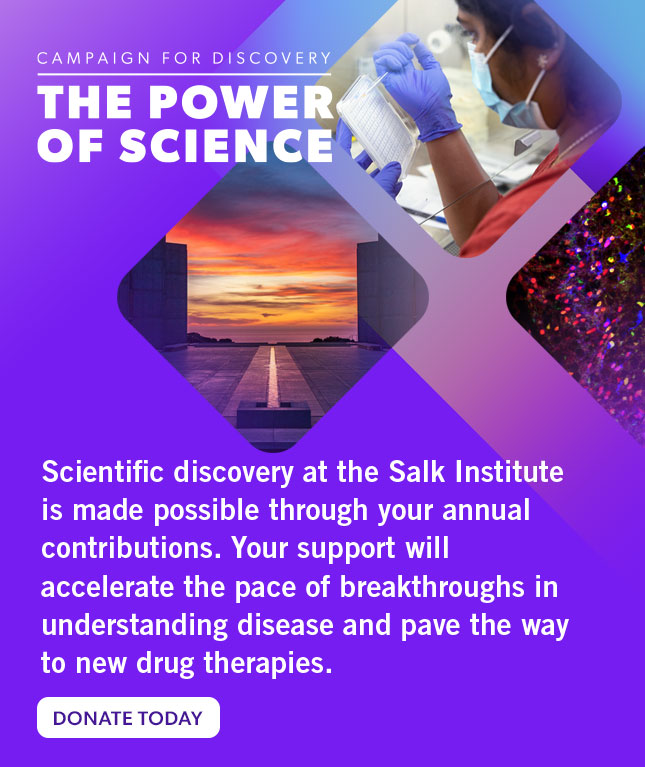In addition to communicating with other cells, cells also have an internal monologue—one that occurs as they regulate gene activity. Assistant Professor Jesse Dixon, Postdoctoral Fellow Zhichao Xu, and colleagues have zeroed in on the specific mechanisms that activate oncogenes—altered genes that can cause normal cells to become cancerous. Cancer can be caused by genetic mutations, yet the impact of specific types, such as structural variants that break and rejoin DNA, can vary widely. The researchers found that genetic mutation activity depends on the distance between a particular gene and the sequences that regulate the gene, as well as on the activity level of the regulatory genetic sequences involved. The work advances the ability to predict and interpret which genetic mutations found in cancer genomes are causing the disease.
Cancer
Microprotein increases appetite in mice
Salk scientists study how biological processes, like metabolism, can be used to improve cancer treatment outcomes. Tiny proteins, called microproteins, have long been overlooked in obesity and metabolic disease research. Now, Professor Alan Saghatelian and colleagues at UC Irvine have discovered that both brown and white fat are filled with thousands of previously unknown microproteins. They also showed that administering one of these microproteins, called Gm8773, can increase appetite in mice. Their findings may lead to the development of a therapeutic to help people gain weight in certain disease situations, such as during chemotherapy for cancer.
Read News ReleaseThree hallmarks of aging work together to prevent cancer
Communication is key for warding off cancerous cells. As we age, the end caps of our chromosomes, called telomeres, gradually shorten. Professors Jan Karlseder and Gerald Shadel and colleagues have discovered that when telomeres become very short, they communicate with mitochondria, the cell’s powerhouses. This communication triggers a complex set of signaling pathways and initiates an inflammatory response that destroys cells that could otherwise become cancerous. These findings could lead to new ways of preventing and treating cancer, as well as designing better interventions to offset the harmful consequences of aging.
Read News ReleaseFeatured Stories
 Journey of a lifetime—The Cancer Center at Salk celebrates 50 years of life-changing discoveriesSalk’s Cancer Center has become a powerhouse of critical discoveries that have led to treatments and remissions for patients. The Center’s mission is to make current generations the last to see cancer as anything other than a routine diagnosis.
Journey of a lifetime—The Cancer Center at Salk celebrates 50 years of life-changing discoveriesSalk’s Cancer Center has become a powerhouse of critical discoveries that have led to treatments and remissions for patients. The Center’s mission is to make current generations the last to see cancer as anything other than a routine diagnosis.  Introducing Salk’s newest president, Gerald JoyceJoyce, a pioneer in the field of test-tube evolution, succeeds Professor Rusty Gage, who will return to his lab following a transformative leadership tenure. Joyce assumed the role April 21, 2023.
Introducing Salk’s newest president, Gerald JoyceJoyce, a pioneer in the field of test-tube evolution, succeeds Professor Rusty Gage, who will return to his lab following a transformative leadership tenure. Joyce assumed the role April 21, 2023.  Reuben Shaw—Unexpected resultsIt’s not every day a young scientist gets a jaw-dropping result he knows no one will believe. But that’s exactly what happened to Professor Reuben Shaw 20 years ago, in the spring of 2003.
Reuben Shaw—Unexpected resultsIt’s not every day a young scientist gets a jaw-dropping result he knows no one will believe. But that’s exactly what happened to Professor Reuben Shaw 20 years ago, in the spring of 2003.
 Tony Hunter—How an animal virus discovery more than 40 years ago led to one of today’s most successful cancer drugsThe story behind how Hunter discovered the first kinase that phosphorylates the amino acid tyrosine. The finding led to the development of Gleevec, a medication that is now routinely used to treat chronic myelogenous leukemia (CML).
Tony Hunter—How an animal virus discovery more than 40 years ago led to one of today’s most successful cancer drugsThe story behind how Hunter discovered the first kinase that phosphorylates the amino acid tyrosine. The finding led to the development of Gleevec, a medication that is now routinely used to treat chronic myelogenous leukemia (CML). Charles Stevens—A beautiful mind, and a heart to matchA pioneer in neuroscience, Distinguished Professor Emeritus Charles F. Stevens died peacefully on October 21, 2022, at his home in San Diego. He was 88.
Charles Stevens—A beautiful mind, and a heart to matchA pioneer in neuroscience, Distinguished Professor Emeritus Charles F. Stevens died peacefully on October 21, 2022, at his home in San Diego. He was 88. Leona Flores—Rocking cancer researchFlores had studied the design of the Salk Institute as an architectural engineering student, but never did she imagine that she would be the executive director of the Institute’s Cancer Center years later.
Leona Flores—Rocking cancer researchFlores had studied the design of the Salk Institute as an architectural engineering student, but never did she imagine that she would be the executive director of the Institute’s Cancer Center years later. Payel Mondal—Cancer researcher by day, financial planner by nightMondal is a postdoctoral researcher in Assistant Professor Christina Towers’ lab where she studies the mechanisms involved in cancer progression. Her hope is that her projects will someday be translated into therapeutics to help people.
Payel Mondal—Cancer researcher by day, financial planner by nightMondal is a postdoctoral researcher in Assistant Professor Christina Towers’ lab where she studies the mechanisms involved in cancer progression. Her hope is that her projects will someday be translated into therapeutics to help people. Salk receives $1.5 million from the Sol Goldman Charitable Trust and $1.25 million from The Jay and Sarah Flatley FoundationThe Salk Institute is grateful to its many generous supporters.
Salk receives $1.5 million from the Sol Goldman Charitable Trust and $1.25 million from The Jay and Sarah Flatley FoundationThe Salk Institute is grateful to its many generous supporters.


















































